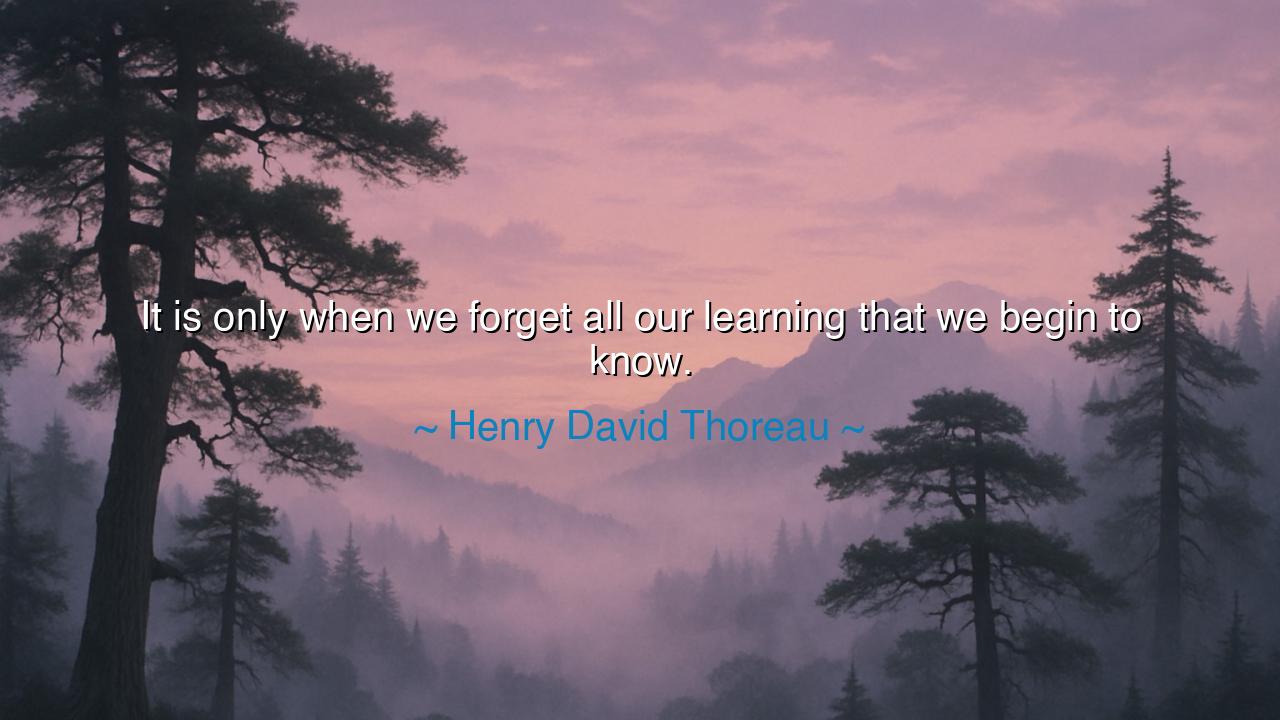
It is only when we forget all our learning that we begin to know.






“It is only when we forget all our learning that we begin to know.” — so spoke Henry David Thoreau, the sage of Walden Pond, whose heart sought truth not in books or lectures, but in the quiet whisper of the natural world. In this mysterious and profound saying, Thoreau reveals the paradox of wisdom: that knowledge, though precious, can also blind; that to truly know, one must first become empty — free from the weight of assumptions, theories, and inherited beliefs. He reminds us that there lies a deeper understanding beneath all our learning, one that cannot be written in words but must be felt in silence.
Thoreau was a man who turned away from the noise of civilization to dwell in solitude among the trees and waters of Concord. Surrounded by simplicity, he discovered that knowledge is not something one merely gathers — it is something one awakens to. In saying, “forget all our learning,” he does not despise education; rather, he warns against mistaking learning for truth. For learning fills the mind, but wisdom fills the soul. The intellect seeks to analyze, to name, to divide; but the spirit seeks to see, to experience, to unite. To begin to “know,” as Thoreau speaks of it, is to look upon the world with eyes no longer clouded by habit, pride, or the arrogance of certainty.
This idea is as old as the mountains. The ancient philosopher Lao Tzu, in the Tao Te Ching, wrote, “To know that you do not know is the highest.” Like Thoreau, Lao Tzu understood that true wisdom arises when we release our need to define everything. When the mind is too full, it becomes deaf to the quiet truths of existence. The cup must be emptied before it can be refilled. Likewise, the mind that forgets its learned certainties becomes open to wonder once more — to the revelation of things as they truly are, not as we have been taught to see them.
To forget our learning, then, is to return to innocence — to the clear sight of a child who marvels at the world without judgment or pretense. The child does not ask what a tree is in scientific terms; it simply feels the tree’s majesty, its movement in the wind, its whispering life. In that awe lies pure knowing, untainted by ego or division. Thoreau’s message is a call to return to that sacred simplicity — to stand before the universe, not as a scholar dissecting, but as a soul beholding.
Consider the story of Isaac Newton, one of history’s greatest minds. After years of study and discovery, he stood at the edge of the ocean of truth and said humbly, “I do not know what I may appear to the world, but to myself, I seem to have been only like a boy playing on the seashore... finding a smoother pebble or a prettier shell than ordinary, while the great ocean of truth lay all undiscovered before me.” Even Newton, whose learning reshaped the world, recognized what Thoreau taught: that the mind’s knowledge is small beside the boundless mystery of existence. Only when we set down our pride in what we think we know, can we begin to truly see.
Thoreau’s words are not a rejection of intellect, but a call to balance. He asks us to let wisdom and learning serve, not dominate, the spirit. In our age, we are surrounded by knowledge — libraries vast as seas, devices that deliver information without end — yet we grow no wiser. We know much, but we understand little. We have learned to measure the stars, yet we have forgotten to gaze at them in wonder. Thoreau’s teaching is a lantern against this darkness: to pause, to unlearn, to listen once more to the quiet truths that lie beyond the reach of intellect.
Therefore, my children, if you would be wise, learn to forget. Forget not as one who neglects, but as one who surrenders — who lets go of the excess to touch the essence. Go to nature, and listen without theory. Speak with others, and hear without judgment. When you read, do not merely collect — contemplate. When you think, let your thought be humble enough to be changed. For in the forgetting of learned noise, there is room for truth to echo.
For the wisdom of Thoreau is this: the mind may learn, but the heart must awaken. Knowledge builds, but understanding breathes. When you forget all that you think you know, you become as the still water that mirrors the sky — open, reflective, and clear. And in that stillness, when all noise has fallen away, you will begin to truly know — not as a scholar knows through words, but as a soul knows through wonder.






AAdministratorAdministrator
Welcome, honored guests. Please leave a comment, we will respond soon